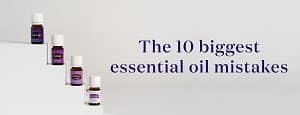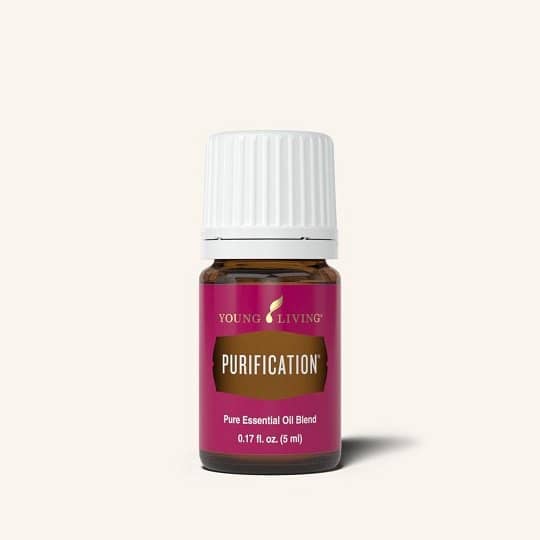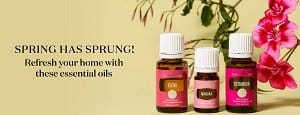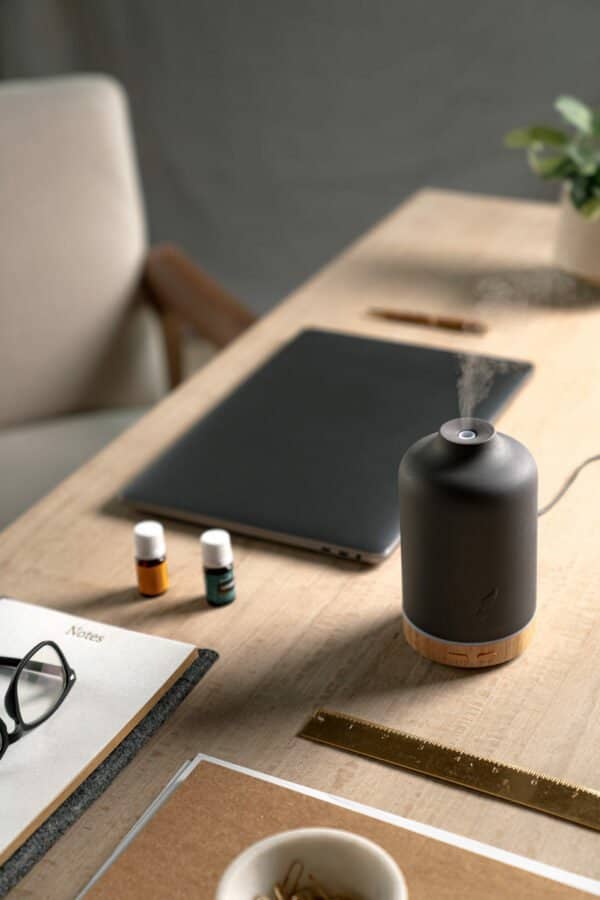Purification Essential Oil Blend
Purification® essential oil blend is a combination of Citronella, Lavandin, Lemongrass, Myrtle, Rosemary, and Tea Tree that is formulated for diffusing to neutralize and cleanse your home and work environment. It is also soothing to your skin for everyday irritations. Created by Young Living Founder D. Gary Young, this blend was crafted to purify the air. The plant sources for these oils come from many exotic and beautiful locations: Lemongrass is native to India, Guatemala, and other tropical countries; and Citronella originated in Sri Lanka.
Purification utilizes these natural resources to brighten and freshen any space.
- Citronella: Has a refreshing aroma
- Lemongrass: Has a purifying aroma
- Tea Tree: Helps eliminate musky odors
Product Profile
-
Soothes skin when applied topically
-
Cleanses the air of unwanted odors
-
Is a great aromatic companion for outdoor activities
-
Freshens musty and stale areas with its clean, invigorating scent
-
Contains Lavandin, an ingredient that helps clean the air
Product Use & Tips
Suggestions from Young Living
-
Topical: Apply 2–4 drops directly to desired area. Dilution not required, except for the most sensitive skin. Use as needed.
-
Aromatic: Diffuse up to 30 minutes 3 times daily.
-
Add a few drops to natural dryer balls to give your laundry a bright-smelling boost.
-
Apply it topically to calm everyday skin irritations.
-
Place a few drops of Purification on cotton balls and stash them anywhere that can use additional freshness: air vents, drawers, shoes, garbage cans, etc.
-
Use Purification in the car with Young Living’s Car Vent Diffuser to fight lingering food and gym bag odors.
-
Add Purification to a glass spray bottle with water and spritz it on linens.
Related to this Product

10 Biggest Essential Oil Mistakes

10 Things Essential Oil Users Do Differently

15 of the Best-ever Solutions to Get Your Home Smelling Divine

20 Essential Oils Under $20

36 Ways to Use a Bottle of Essential Oil

8 Diffuser Blends You’ve Got to Try: We Have One for Every Room!

A Guide to Purification Essential Oil Blend

An Essential Oil User’s Guide to Aromatherapy

Cheat Sheet: A Guide to Essential Oils and Their Best Uses

Cleaning without Toxins: 8 Plant-based Cleaning Products
Diffusing Notes
These are approximate drops. Adjust recipes to your needs. If a recipe is too strong for you, add fewer drops. Do you need more? Just add more, but no more than 8-12 drops for all of our diffusers with the exception of the Aria diffuser which requires 15-25 drops.
Tip: When you first begin diffusing, start with less essential oil than listed in the recipes and build to more as desired. You should give your body time to adjust to the essential oils. Almost all the Young Living diffusers are ultrasonic which provides a cool-mist humidifier along with the essential oils. These diffusers are safe to run all day. Pay attention to the size of the room because the size will impact the intensity of diffusing. Nebulizers and atomizers are different than ultrasonic diffusers because they do not use water. For these, note the time limit for diffusing stated on each individual oil bottle.
Ultrasonic Diffusers
Ultrasonic diffusers work by using vibrations to break down water and essential oils into tiny particles, creating a fine mist that is released into the air. Inside the diffuser, there’s a small disc that vibrates rapidly, usually at ultrasonic frequencies (beyond what humans can hear). This vibration agitates the water and oil mixture, breaking it into micro-droplets that are then dispersed as a mist. This mist carries the pleasant aroma of the essential oils and tiny water particles, helping to humidify the air and spread the fragrance throughout a room. Ultrasonic diffusers are popular for their ease of use, quiet operation, and ability to provide both aromatherapy benefits and a visually appealing ambiance.
Cleaning Your Diffuser
- Always turn off and unplug the diffuser prior to cleaning.
- To ensure proper performance, clean the ultrasonic plate and lid after each use.
- If essential oil begins to build up on the ultrasonic plate, gently wipe it off using a cotton swab dipped in rubbing alcohol.
- If essential oil begins to build up on the lid, gently wipe it off using mild soap and water only.
- Never use a corrosive detergent to clean the ultrasonic plate or damage will occur.
- Periodically check under the diffuser to keep the fan intake free of debris.
- Debris can be removed by blowing on the fan intake opening or wiping with a clean, dry cloth. (Do not use aerosol sprays, solvents, or abrasives to clean the plastic housing.)
- When not in use, clean the diffuser and store dry. Replacement ultrasonic plates can be purchased from Young Living.
Aromatherapy
When odorant molecules attach to odorant receptors, your body responds by sending electrical impulses into your brain. This causes different physiological reactions depending on the aromas detected.
The sense of smell has a profound impact on your emotions and inner desires. Those scents can set the mood or bring up memories before you are even aware of it.
Aromas impact your body and they can set the mood and atmosphere in any environment.
The sense of smell is directly connected to the limbic lobe of your brain, also known as the emotional control center. The limbic lobe plays a big role in your mood, memory, behavior, feelings, and emotions, and it is connected to the olfactory bulb in the nose.
How to Use Essential Oils
Aromatically, Topically, Internally & Safely
You just purchased a bundle, kit, or collection of essential oils. Now you’re overwhelmed by how to use them. We’ve all been intimidated by how to use essential oils. With a little practice and this simple guide, you’ll be an expert in no time.
This video covers how to use essential oils:
• Aromatically
• Topically
• Internally
• Safely
How to Apply Essential Oils - Three Main Methods
Stumped on how to apply your essential oils? How you apply an oil depends on what benefit you want to get out of it. Different oils offer different benefits, depending on how and where you apply them. So, before using any new essential oil, be sure to check that oil’s uses and benefits and read any labels and instructions that come with it. If you have questions or concerns, check with your healthcare provider.
Using Essential Oils Aromatically
Let’s start with the hallmark way to use essential oils: aromatically. All essential oils feature a signature aroma you can smell and inhale for various effects. One oil’s crisp scent can invigorate you when you need a midday pick-me-up. Another’s soothing aroma can help you unwind after a tough day. You can use essential oils aromatically by simply opening the bottle and inhaling its aroma. They can also be applied topically as a personal fragrance, but always dilute them with a carrier oil, which is a plant-derived oil like coconut or almond oil. Dilute a few drops of essential oil with your carrier oil and then rub it into your palms and inhale or dab some behind your ear or on your neck. You can also use a diffuser to disperse the essential oil into the air.
Using Essential Oils Topically
Another favourite way to apply essential oils is topically, where you allow the oil to absorb into your skin. As mentioned before, always dilute oils with a carrier oil before you apply them topically. Topical oils can become part of a massage or added to your preferred lotion, moisturizer or other personal care product. Some oils, particularly those from the citrus family, can cause photosensitivity. A carrier oil is a plant-derived oil like coconut and almond oil that can be used to dilute an essential oil’s concentration.
Using Essential Oils Internally
If you think an oil smells terrific, wait until you taste it! You can season your favourite dish or flavor a drink with certain grades of essential oils. Ingesting oils lets you savor all their savory, herbaceous, spicy, fruity potential. The simplest ways to take essential oils internally is to add them to a glass of water, take them in a capsule or use them as seasoning. Start off with a small amount. A little goes a long way, and even a single drop might overpower your recipe. One recommendation is to dip a toothpick in the oil and stir that little bit in as a starting point. Of course, before you use any oils internally, make sure the oil is safe to ingest. Unless it specifically says on the label that it’s safe for ingestion, assume it’s safe for external use only.
Diffusing Blends with These Oils
How to Use Purification Essential Oil Blend
The Young Living Training and Education team teach us all about the Purification Essential Oil Blend! Watch to find out more about the blend’s ingredients, power properties, and more!
Fresh Space Collection
If the smells in your fridge are more mystery than “mmm, mmm, good,” infuse a fridge freshener with a few drops of Purification® (included) and stick it inside the door. You’ll lose those leftover smells and that not-so-chic box of baking soda. You can also stick a Lemon-boosted freshener next to your sink to dispose of bad odors or enjoy the rejuvenating aroma in the shower.
This collection includes:
• Charcoal fridge deodorizer balls and white silicone sleeve
• Lemon essential oil, 15 ml
• Purification essential oil blend, 15 ml
Diffusing Notes
These are approximate drops. Adjust recipes to your needs. If a recipe is too strong for you, add fewer drops. Do you need more? Just add more, but no more than 8-12 drops for all of our diffusers with the exception of the Aria diffuser which requires 15-25 drops.
Tip: When you first begin diffusing, start with less essential oil than listed in the recipes and build to more as desired. You should give your body time to adjust to the essential oils. Almost all the Young Living diffusers are ultrasonic which provides a cool-mist humidifier along with the essential oils. These diffusers are safe to run all day. Pay attention to the size of the room because the size will impact the intensity of diffusing. Nebulizers and atomizers are different than ultrasonic diffusers because they do not use water. For these, note the time limit for diffusing stated on each individual oil bottle.
DIY Garbage Disposal Fresheners
Ever wonder what that funky smell is coming from your kitchen sink? We’re not exactly sure what it is either, but we do have a solution: DIY garbage disposal fresheners!
This easy DIY takes less than an hour, including cleaning up after! It’s natural and the fresheners will make your garbage disposal smell as fresh and clean as the day you bought it.
Ingredients:
• 1 cup baking soda
• ½ cup salt
• ¾ cup liquid Castile soap
• 30 drops essential oil
• Measuring spoon (we used a tablespoon)
Directions:
1. Combine baking soda and salt in a bowl.
2. Add Castile soap and essential oils. (See our scent ideas below!)
3. Add water, 1 tablespoon at a time, until the mixture reaches the texture of wet sand. (YL tip: If you add too much water, the mixture won’t pack together or dry properly. Add more baking soda and salt to get the texture of wet sand.)
4. Pack the mixture into the measuring spoon. (YL tip: To get your freshener out of the measuring spoon, tap the spoon lightly on the counter until the contents slide out. Be careful! The mixture hasn’t dried yet, so it might be fragile.)
5. Let the fresheners dry for about 24 hours.
6. Store in a sealed glass jar and keep dry.
To use:
Put 1-3 fresheners in your garbage disposal. Turn the faucet on a steady cold stream and run the disposal for up to 1 minute.
Scent combinations:
• Classic Clean: 20 drops Thieves® and 10 drops Lemon
• Citrus Herb: 10 drops Rosemary, 10 drops Grapefruit, 5 drops Lemon, and 5 drops Peppermint
• Freshen Up: 10 drops Purification®, 10 drops Eucalyptus Radiata, and 10 drops Spearmint
Related Areas

Can essential oils expire? Understanding essential oil oxidation

Why Patents Matter to Essential Oils

How to Store Essential Oils: Get the Most Out of Each Drop

What are “hot” Oils and How Can I Use Them?

Why Should You Put Essential Oils on Your Feet?

The Science Behind Aromatherapy

Which Type of Diffuser is Right for You?

The Story Behind Essential Oil Prices
* The statements and information regarding these products have not been evaluated by the FDA. Young Living products are not intended to diagnose, treat, cure, or prevent disease. Most of the product information describing Young Living products is directly from Young Living Essential Oils, LC, and can be found online at YoungLiving.com
See more about toxins in your home.








